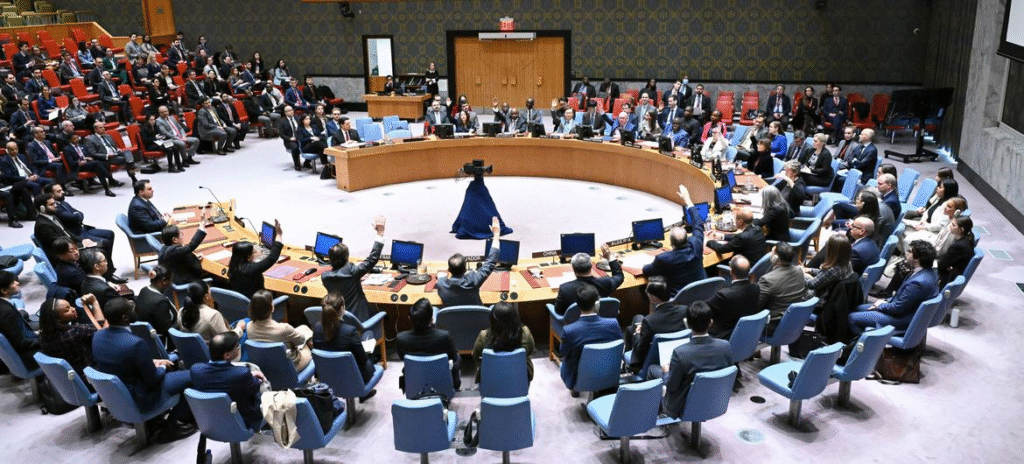The Veto and its Echoes: Navigating the Complexities of the Gaza Ceasefire Debate at the UN Security Council
The United Nations Security Council, designed as the primary global body responsible for maintaining international peace and security, often finds itself at the crucible of geopolitical tensions. Few issues encapsulate this more acutely than the enduring conflict in the Gaza Strip. The recent news that the United States cast the sole veto against a resolution urging an immediate, unconditional, and permanent ceasefire in Gaza, coupled with a demand for the release of all hostages, highlights the profound and often irreconcilable divisions among major powers regarding the path to peace in the region. This action, while consistent with past U.S. policy, reverberates globally, drawing scrutiny to its implications for humanitarian aid, international law, and the prospects for a lasting resolution.

Immediate Consequences and Humanitarian Impact
The immediate consequence of the U.S. veto is the continued lack of a unified international mandate for a ceasefire. While the resolution was largely symbolic in its ability to physically halt fighting, a Security Council resolution carries significant moral and political weight. It represents the collective will of the international community, pressuring belligerents and setting a framework for future diplomatic efforts. By blocking such a resolution, the United States effectively denies this collective expression, leaving the humanitarian crisis in Gaza to worsen without a clear, internationally sanctioned pause in hostilities. For the besieged population of Gaza, facing dire conditions, every missed opportunity for a ceasefire translates into prolonged suffering, loss of life, and exacerbated displacement.
U.S. Rationale and Strategic Alignment
The rationale behind the U.S. veto is multifaceted, deeply rooted in its strategic alliance with Israel and its specific approach to the conflict. Washington has consistently argued that a ceasefire without the prior release of all hostages and without adequately addressing Israel’s security concerns against Hamas would be premature and ultimately unsustainable. The U.S. position often emphasizes that a ceasefire must be part of a broader, more comprehensive deal that ensures Israel’s security and dismantles Hamas’s military capabilities. From this perspective, an “unconditional” ceasefire, as proposed in the vetoed resolution, could be seen as undermining ongoing negotiations for hostage release and potentially allowing Hamas to regroup. This stance, however, places the U.S. in opposition to a vast majority of the international community, who prioritize the immediate cessation of violence and humanitarian relief.
The Veto Power and UN Credibility
Moreover, the U.S. veto underscores the inherent limitations of the Security Council’s structure, particularly the power of the permanent five members (P5) to block any substantive resolution. While designed to prevent impulsive action, the veto power can, and often does, paralyze the Council when the national interests of a P5 member diverge from the collective will. In the context of Gaza, this has led to accusations of hypocrisy and a perceived double standard, where humanitarian concerns are seemingly secondary to geopolitical alliances. For many, the consistent U.S. use of its veto in resolutions critical of Israel erodes the credibility of the UN and fuels cynicism about the effectiveness of international institutions in addressing conflicts where powerful states have vested interests.
Future Diplomatic Challenges
Looking ahead, the U.S. veto complicates future diplomatic efforts. While the U.S. maintains that it’s working behind the scenes on a more viable path to peace, including hostage deals and humanitarian pauses, its public stance at the UN sends a powerful message. It risks alienating allies who share humanitarian concerns and emboldening those who see the U.S. as an impediment to a just resolution. The path to a permanent ceasefire and lasting peace in Gaza remains arduous, requiring not just a cessation of hostilities but also a robust framework for reconstruction, governance, and addressing the root causes of the conflict. The UN Security Council, despite its current deadlock, will undoubtedly remain a crucial arena for these debates, and the U.S. will continue to face pressure to align its actions more closely with the broader international consensus on humanitarian imperatives.
In conclusion, the U.S. veto of the UN Security Council resolution for an immediate Gaza ceasefire is a significant event with far-reaching implications. It reflects the deep complexities of the conflict, the diverging priorities of key international actors, and the inherent challenges in achieving consensus within the UN system. While the U.S. cites its security concerns and commitment to a comprehensive solution, its solitary vote against a humanitarian plea highlights the profound moral and political dilemmas at play, leaving the future of Gaza and the effectiveness of multilateral diplomacy hanging in the balance.




















